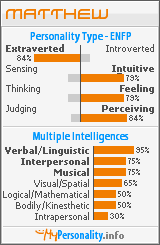Storms rock. There's the sunshine afterward to look forward to.
Sunday, October 5, 2008
Words of the Prosecution
It is impossible to predict what the future has in store for any of us. This is precisely why people feel the need to judge the past. And we of the court have been charged with the solemn duty of passing such judgement. - Prosecutor Godot
Forget the courtroom, it is true in many instances where people call back memories and events of the past to try predict the future or understand the present. Take for instance, knowing a thief personally. Knowing what he has done before, we (whether knowingly or not) deprive him of his second chance to be trusted because we judge him for his past and try our best to keep our stuff away from him while we know he'll be alone with our stuff. One might say it's only logical to do so. But then it begs the question: Who are we to decide what someone will or will not do?
Prevention is better than cure, people say. That may be true in some, or most, instances, but what if some people have truly regretted their actions and are never given the chance to prove that they have turned over new leaves? How then would they feel? Is it a risk we are willing to take? If so, we run a different risk, that of not quite knowing exactly the extent to which someone can be a wonderful person, once he throws away the chains of his past and turns back to the side of good.
Sometimes, the chains of the past someone bears may be made heavier than desired because people make them heavier by constantly calling them to mind when they would like nothing better but to forget them. Bringing back the example of the thief, if he had truly reformed, he would be devastated once his friend makes a comment to another friend like "I'll follow you. Oh wait, *insert name here* will be alone with my stuff." A variation of this comment might be made in jest, or subconciously as we consider what we know of the person. But to the reformed thief, it is a painful reminder of how his future with the same people is that much different because his past is constantly judged.
Those are the consequences of his wrongdoing? That can be true, but such treatment of the reformed thief (or any wrongdoer) will only exacerbate his situation. For the truly reformed, the guilt and punishment were enough consequence, and the scar that is left hurts enough, without the help of others to constantly prod it before it heals, if it ever does.
Are we humans so self-centered that our primary thoughts are to guard against any perceived possible danger to ourself and our belongings without solid proof? Past events are not enough reason to inflict such emotional pain on people who have truly repented and want to forget the past. Perhaps then the key to all this is not to try and predict futures by judging pasts, but thinking through whether the judged deserves the right not to be judged so. Maybe we ought to think rather on whether the person in question has learnt his lesson and hence deserves his painful past to be erased.
If we think of it this way, Prosecutor Godot is wrong, then.

